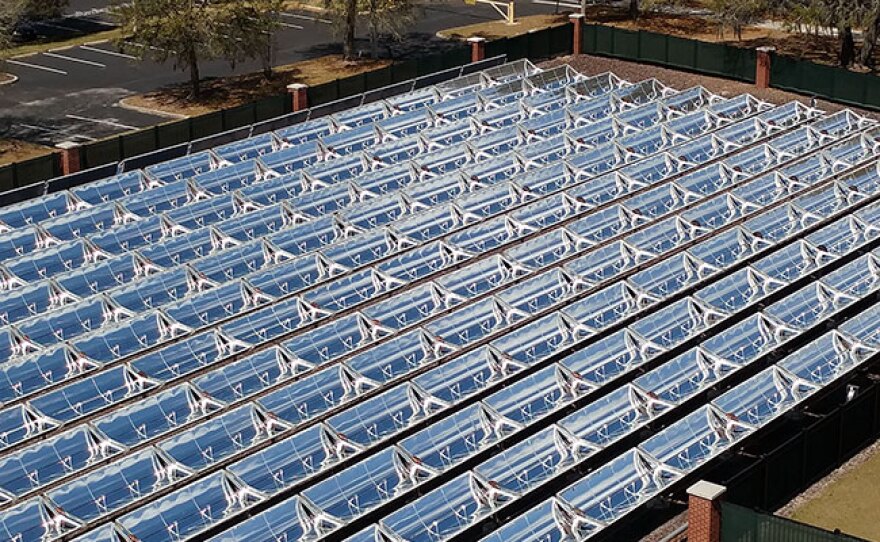Florida is called the “Sunshine State,” but we don’t really live up to the name when it comes to solar power.
Research by the Solar Energy Industries Association shows that while we’re third in the nation for rooftop solar potential, we’re 14th when it comes to solar capacity that’s actually been installed.
The University of South Florida is trying to change that, with ground-breaking research and solar installations at both the Tampa and Saint Petersburg campuses.
One of the most visible projects is a large solar thermal power plant on the south end of the Tampa campus. The Solar Power Research Demonstration Project is part of the Clean Energy Research Center.
"This plant is actually putting electricity into the (Interdisciplinary Research) Building which is next to the plant," Center Director, Professor Yogi Goswami, said. "And so, if it produces more energy than the building can use, it can feed it back into the grid."
The plant’s 200 solar panels generate about 50 KW of power, but work is being done to double the capacity. That 50 KW would be enough to power around 10 average households.
The system senses sunlight – or more precisely, the amount of solar radiation - coming in. The panels then follow the sun automatically throughout the day or shut down if there’s not enough sunshine.
But right now, the plant doesn’t have any way to store any of that energy for a literal rainy day.
"We’re looking for funding from the state so that we can not only provide storage here, but also demonstrate to companies how they can use storage to overcome intermittency of solar," Goswami said.
Instead of large, expensive batteries, that storage includesa cost-effective system Goswami helped develop that’s based on golf ball-sized capsules of salt wrapped in ceramic.
"As salt is heated, it melts and therefore stores a lot of energy, and when you take energy out of it, it freezes back and releases that energy," Goswami said.
He added that demonstrating the usefulness of such storage methods could be a driver for further investment in solar power.
"It’s very important for us to use as much solar energy to grow businesses over here that produce equipment, components that are used in solar energy systems and really create a lot of employment in the state," Goswami said.

Goswami pointed out that the plant serves one more important purpose – it’s a ‘hands-on’ classroom for students interested in solar.
"It’s not enough for them to read it from the textbooks or hear lectures," Goswami said. "Iit’s very important for them to be able to come and see a plant like that, be able to touch it, be able to work on it, and, if needed to, fix it if it’s not working."
PhD student Francesca Moloney said one of the other benefits of the plant is giving students the opportunity to learning how to work as a team.
"So here, everyone’s coming from a different background, I’m coming from a civil engineering background, but I’m now going into mechanical (engineering)," she said. "There’s other students that have backgrounds in mechanical and chemical in our lab; it’s a collaboration of all these students."
Student collaboration is driving another solar project on the Tampa campus.

A team led by Environmental Science and Policy senior John Pilz has received approval to add over a thousand solar panels to the solar film system already set up on the roof of the Marshall Student Center.
"Well, at some points of the day, this center will be solar panel-powered completely – as in, this building will be putting out more energy than it’s taking out from the grid," Pilz said.
The project has received more than $1.4 million from the USF Student Green Energy Fund. That’s a student fee-funded effort that encourages students to come up with ideas that reduce campus greenhouse gas emissions.
Pilz, who’s also a first year law student at Stetson University, has had four other ideas approved by the Fund, including electric vehicle charging stations and a tree planting day set for next fall.
"To me, the most important thing about the Student Green Energy Fund is that it does take student ideas, from any kind of student," Pilz said. "It doesn’t mean you’re a researcher, it doesn’t mean you’re a business student, it doesn’t mean you’re anything that might traditionally be, well, associated with green energy."

Similar student efforts – along with a million dollar grant for Duke Energy – led to the installation last year of a solar array on top of a seven story parking garage at USF St. Petersburg.
The system powers the garage 24 hours a day, seven days a week, thanks to a pair of huge batteries made by electric car maker, Tesla.
"It’s not only a great thing for students, but for everyone in our community," student David Vasquez of the USFSP Office of Sustainability said at the array’s formal unveiling last May. "The more people are used to seeing big energy solar arrays on roofs, the more people are going to want them, the more it’s going to become normal and then we’ll have a culture where everyone cares for the environment."
Student group, the International Solar Energy Society, is holding a free solar fair, showing off the research and facilities on the Tampa campus Saturday, March 26th.
You can also see the USF solar sites on the next University Beat on WUSF TV, Sunday, March 27th at 630 p.m.









